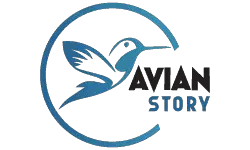Do Hawks Eat Ducks? The Facts Behind Hawk Predation
Whenever we talk about duck predators, hawk’s name automatically comes to the list. But what’s the actual scene? Can a hawk really hunt anything bigger than itself? Do hawks eat ducks? Stop guessing! Cause today I’m going to clear everything about this.
Hawks can eat anything, including ducks, if they can catch one. Though ducks are not in hawk’s regular dining, some larger and more aggressive hawk species, for instance, Northern Harries or Red-Tailed hawks somethings hunt and eat ducks.
In the rest of the article, I’ve discussed in detail every relevant topic about this, including if a hawk hunt ducks or ducklings, can a hawk pick up a duck, and how to protect ducks from a hawk’s talons. If you are curious about this fascinating bird hawk’s dining habits, stay tuned till the end.
How Do Hawks Hunt Ducks?
It actually depends on hawk species, dining habits, availability of prey, and, most importantly, ducks’ size.
Hawks usually prefer to carry off their prey and enjoy it in peace. When it’s about chickens, ducks, or other poultry birds, they need to do it for their safety. But because of the duck’s size, it’s really a tough catch for most of the hawks. However, hawks can easily prey on ducklings, young or injured hawks, and carry off them.
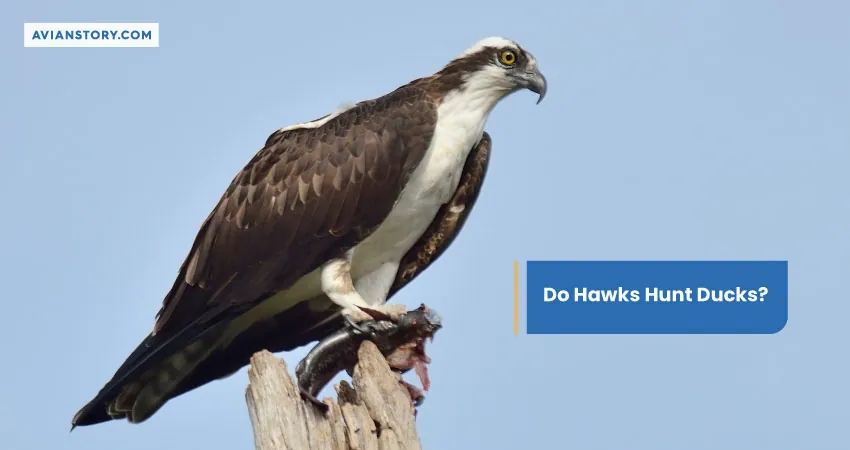
But if it’s hungry, it may take the chance to hunt a duck and eat it on the ground. Only large hawk species can hunt an adult duck.
In Northern America, there’s a term called “Chicken hawks”. Cooper’s hawk, sharp-shinned hawk, and red-tailed hawks are known by this name. People think that these hawks’ diet only consists of chickens, ducks, and other poultries.
But the truth is these hawks don’t usually prey on poultry. Instead, they prey on rodents, lizards, squirrels, snacks, and small birds.
Can A Hawk Pick Up A Duck?
To get an exact answer to this question, let’s see the average size of these two birds. Considering the fact that a hawk can’t pick up something bigger than it.
Though the size of ducks varies depending on their species, the average size of a duck is 1.6 to 3.5 pounds. They can be up to 15 pounds. Usually, male ducks tend to be larger than female ducks.
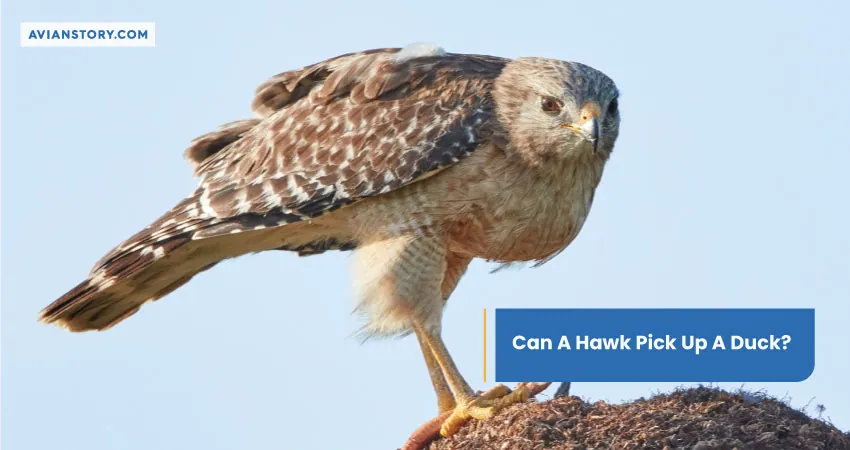
On the contrary, the largest hawk species, the Ferruginous hawk’s average weight is 2 to 4.5 pounds, whereas the smallest hawk, sharp-shinned, can be 82 to 220g.
So it’s hard for even the largest hawk species to pick up an adult duck.
Sometimes Farraginous or Northern Goshawks may carry an adult duck. But other hawk species are not strong or large enough to pick off an adult duck. So even though they can’t fly with one, they may hunt adult ducks with their sharp curved talons and start feeding on the ground. However, most hawks can easily pick up ducklings or young ducks and fly away.
Do Hawks Eat Ducklings?
As adult ducks is a tough prey for hawks, it’s normal to assume that ducklings are their preferred prey of them. But the truth is hunting ducklings is not a common scene in the hawk’s community. Instead, they prefer to eat small birds, fish, rats, mice, squirrels, reptiles, or rabbits.
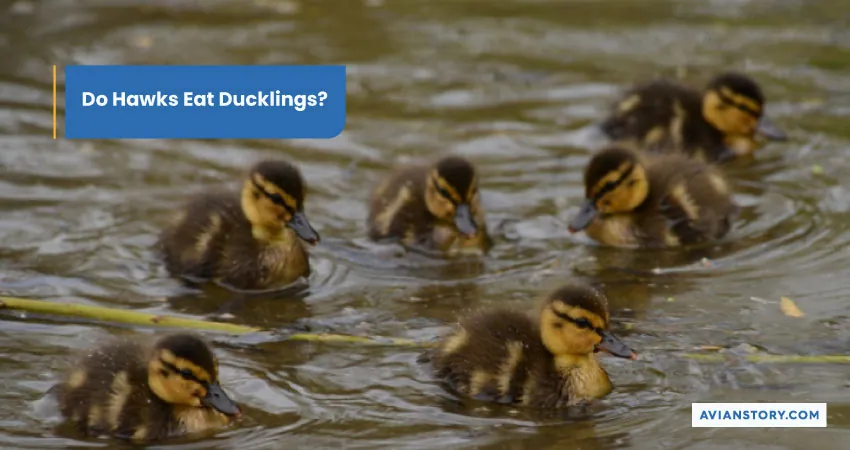
By the way, ducks usually roam or swim in a group. After hatching, ducklings stay near their mother as they can’t swim fast or fly away. So they become the most vulnerable and tempting meal to the predators.
If a hungry hawk finds any ducklings unprotected, it may take advantage and add it to its launch.
Do Hawks Eat Duck Eggs?
Hawks are known to attack other birds’ nests and eat their eggs and hatchlings. So do hawks eat duck eggs as well?
The answer is obvious. As hawks are opportunities, they can eat anything they can catch with their talons, including duck eggs. But actually, duck eggs are not in hawk’s regular diet. They may occasionally have one if it’s unprotected.
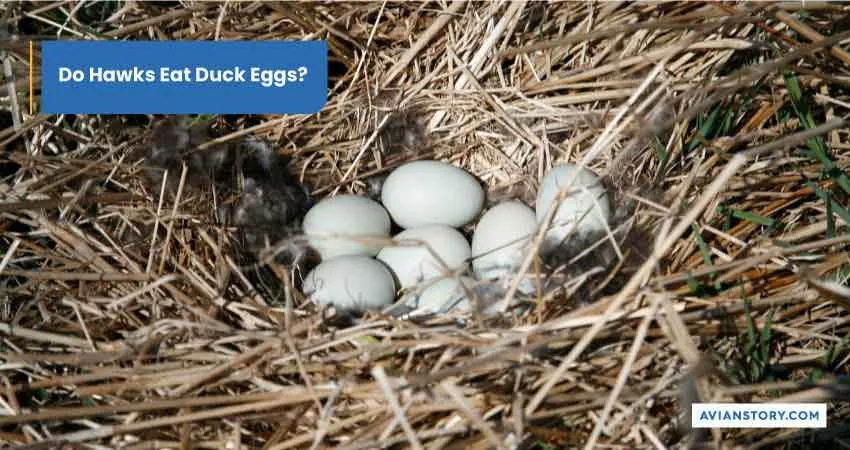
Ducks need to incubate their eggs for almost four weeks to hatch. So, almost all the time, a female duck is sitting on the eggs. That’s why predators don’t get a chance to eat eggs until they attack the adult one first.
How To Protect Ducks From Hawks?
Free-ranging ducks flock can be vulnerable to predators, particularly flying predators like a hawk. To protect your duck flock from hawks, you have to give some extra effort.
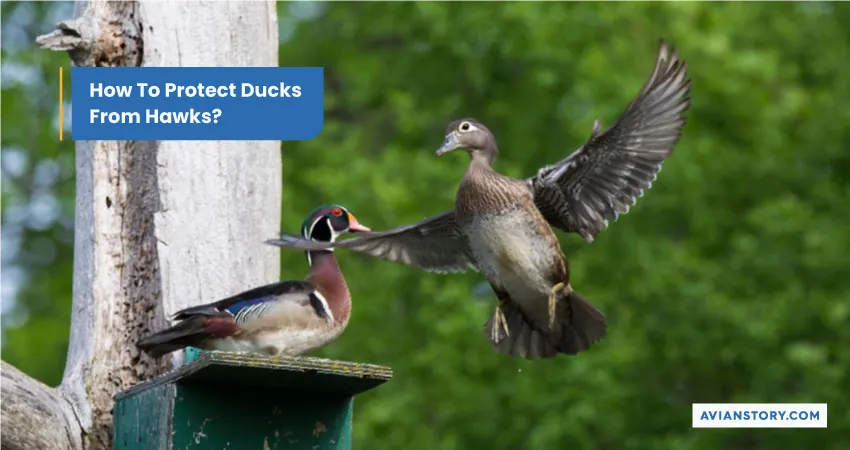
Here are some effective ways to protect ducks from hawks:
1. Move The Ducks Inside Coop
If you have seen any hawk flying over your duck’s flock, it’s not a good sign for your ducks. You should move the ducks inside the coop for the next few days, so the hawk realizes that the buffet he had found is no longer there.
Sometimes, when a hawk succeeds in hunting any duck or chicken from a flock, they come back the next day for another one.
2. Poultry Netting
To save free-ranging ducks from flying predators like hawks adding a net cover will be the best solution. You can consider colorful rope nets or other fences.
3. Install Predator Decoys Or Reflectors
Hawks won’t step in when another predator is already there. You can install a hawk, owl, or eagle decoy. This will keep hawks away from your ducks.
What Other Animals Eat Ducks?
Hawks are not regular predators of ducks. But there’s a long list of duck-craving predators. They regularly prey on ducks, ducklings, and eggs.
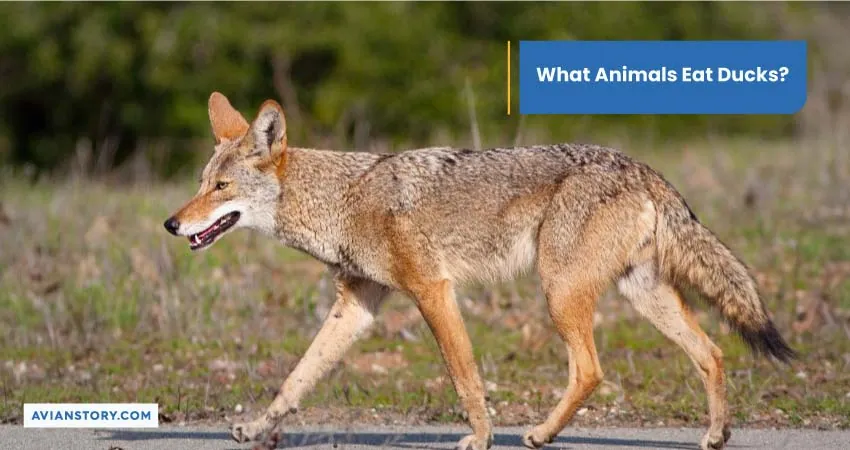
Let’s see what animals hunt and eat ducks:
- Red Foxes
- Badgers
- Gulls
- Coyotes
- Weasels
- Opossums
- Raccoons
- Skunks
- Snacks
- Birds Of Prey
- Corvids, etc.
Final Words
Ducks are not in hawk’s regular dining as it’s hard to prey on one for even the largest hawk species because of its size. But occasionally, larger hawk species like Ferruginous or Northern Goshawks have been seen hunting and eating ducks. They use their sharp talons to tear off a duck’s breast and neck and squeeze it until it dies.
However, though ducklings are easy prey, they are also not on hawk’s regular diet. Instead, they prefer to eat small birds, fish, rats, mice, squirrels, reptiles, or rabbits.
But if there’s any injured, young or dead duck in front of a hungry hawk, it will likely take advantage of it.
